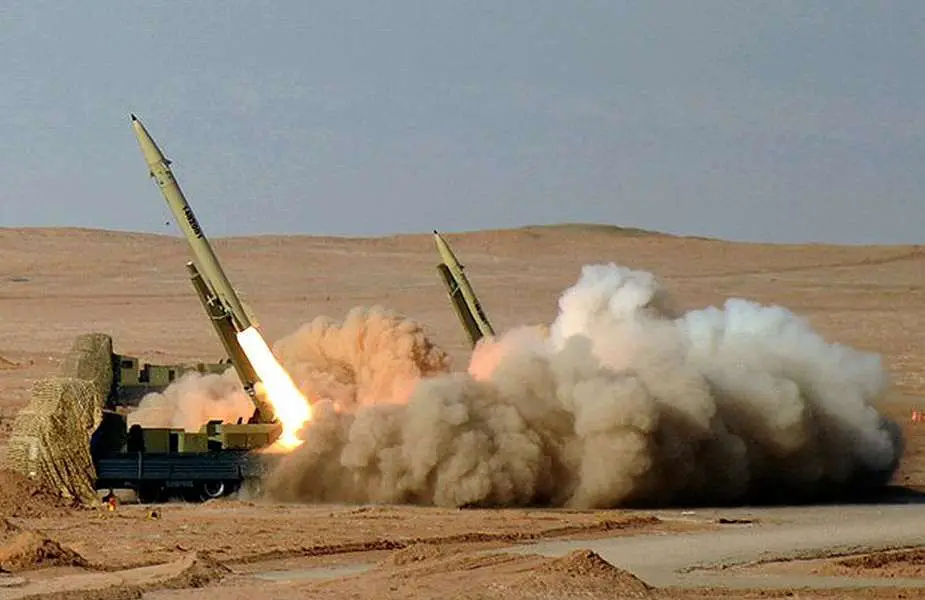Breaking News
Breaking News: Iran Boosts Domestic Drone and Missile Production Amid Russia-Ukraine Conflict.
According to the Institute for the Study of War, Iran is ramping up its domestic drone and missile production capabilities, potentially enhancing its military support to Russia amid the ongoing conflict in Ukraine.
Follow Army Recognition on Google News at this link

Iran has already delivered to Russia an undisclosed number of Fatteh-100 solid-fueled surface-to-surface ballistic missile, which has a maximum firing range of 300 km. (Picture source: Wikimedia)
In related news, Reuters reported on July 7, 2024, that commercially available satellite imagery reveals significant expansion at two defense industrial sites near Tehran. The imagery shows over 30 new buildings constructed at these sites, aimed at bolstering the production of ballistic missiles and drones. The expansion reportedly began at the Khojir missile production complex in August 2023 and at the Shahid Modarres base in October 2023, according to a Western analyst cited by Reuters.
Iran's military support for Russia has intensified as the Ukraine conflict continues, with Tehran supplying drones and potentially missiles to aid Russian forces.
Iran has delivered large numbers of drones to Russia, including the Shahed-131 and Shahed-136 models, which are often referred to as "kamikaze drones" due to their single-use, explosive payload design. Russia has reportedly ordered between 2,000 and 2,400 drones from Iran. These drones have been instrumental for Russia, enabling sustained strikes on Ukrainian targets at a relatively low cost.
Iran has reportedly supplied Russia with a significant number of ballistic missiles to support its war efforts in Ukraine. These deliveries include short-range ballistic missiles such as the Fateh-110 and Zolfaghar, which are capable of striking targets up to 300 to 700 kilometers away. Multiple shipments have been confirmed, with some transported by ship via the Caspian Sea and others by plane.
Iran’s involvement has allowed Russia to maintain a higher operational tempo in its missile strikes against Ukrainian targets. This support has not only provided Russia with critical military supplies but also given Iran a valuable testing ground for its missile technology in a high-intensity conflict setting, potentially leading to improvements in their own military capabilities
Iran's involvement in Ukraine serves its own strategic interests by enhancing its military technology and capabilities. The conflict offers Iran a real-world testing ground for its drones, allowing it to refine their effectiveness in high-intensity warfare scenarios. This military collaboration also strengthens Iran's geopolitical ties with Russia, potentially providing Iran with advanced military technologies and economic benefits in return.
This partnership has drawn international condemnation and has led to new sanctions against Iran by the European Union and the United States, aimed at curbing its military support to Russia and its destabilizing activities in the region.
Since the onset of the war in Ukraine in February 2022, Iran and Russia have significantly deepened their strategic partnership, driven by mutual interests and shared opposition to Western influence and sanctions.
Both countries have expanded their economic ties, focusing on bypassing Western sanctions. This includes increasing bilateral trade, utilizing Iran as a transit route for Russian goods to other regions, and adopting financial systems that do not rely on the US dollar. These measures are aimed at reducing the impact of sanctions and fostering economic resilience
Iran has politically supported Russia's invasion of Ukraine, framing it as a legitimate response to NATO's expansion. This alignment has strengthened as both nations face isolation from the West. Iran views its partnership with Russia as a strategic counterbalance to Western pressures and a means to bolster its own regional influence and military capabilities (Atlantic Council) (IISS).


























